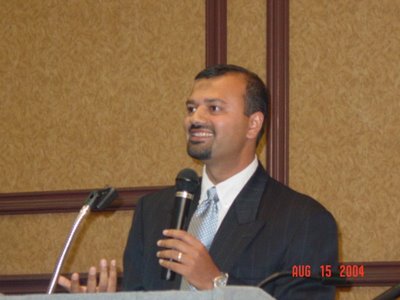Types of Muslims
Today seemed like the real beginning of our trip. After breakfast we went to visit the grave and then the parents of a staff member of Islamic Relief who gave his life delivering food to the needy. It was January 2004, and the car 4 people were driving in lost a wheel and crashed, killing all four inside. Only the tough terrain of the land could have caused such an accident. From Nalchik it was a 30 minute drive to the village where Murad lived and is now buried. The graveyard was on a hill overlooking the entire village. A small village, the only mosque in town, on the main road was built by the efforts of Murad in raising money for it from across the world. His father is now the caretaker and lives just a few hundred yards from it. As we went up to pray fatiha at his grave, I could see the mood of the IR staff with us to one of somberness. Afterwards, we went a visited his parents and it is interesting to note that from the moment we arrived, his mother was in tears and speaking of him and his father only said “that was the will of Allah”. I think the difference between the two response has much to do with the nature of men verses women and the merciful nature that women have. No matter what her son would have been like, evil, bad, etc. a mother would only remember the good, where as a father would remember both if not only the bad, if the bad was done to him. Murad was good person who gave his life in “helping the needy”, so this doesn’t apply here, but in general mothers are more forgiving of things done to them by their children.
Another point of note is the hospitality of the people here. I mean it goes without saying that all over the Muslim world, this culture is something great that even if the religion was lost, hospitality was not. It is also something I find is lacking in the west. Funny thing is, we are hospitable to people who come to our houses, but outside our homes we can be the cruelest of people. Maybe we need to define “our houses” a little more broadly to include the entire world. This way, we begin to feel that anybody anywhere who is living on this earth deserves our hospitality. After all, aren’t we the caretakers (khalifas) of this world. If we did do this, then probably most violence, torture, humiliation, and other evils would stop. After all, when was the last time you heard of a person committing on a guest, even though that guest was rude. At most, you would ask them to leave. A little simplistic, maybe, but a thought to ponder.
We did not tell the parents of Murad in advance that we were coming because if we had, they would have prepared a huge meal for us. However, having shown up unannounced, within 10 minutes, they were bringing out food that had been prepared then and there. They had prepared a dish called khichin, like a paratha with cheese inside of it, a stack of about 15, drinks, bread, and fruit. We quickly ate some and left for if we hadn’t, more food would have been on its way.
On the drive back, and so far throughout the time here, I have noticed the number of bars in and around town. On asking our guide in Moscow earlier about the economy of Nalchik, he said it was mainly Vodka. It is very easy at first glance to be judgmental about Muslims in this area drinking alcohol, but one must be reminded of where these people are coming from. For example, in Nalchik, with a population of approximately 300k, there is only one mosque. Why? Because in communist times, all were destroyed and even the current one was built after the Communist fall. Communism stripped the population of its religion and anger was subsided by making alcohol cheaper than water. So maybe the first and second generation held fast to tenets of the religion, secretly teaching their children about Islam, but how long could that last? By the third generation, a society begins to lose its previous religion and adopts the one that is taught in school, on TV, radio, in the streets, and all around: the religion of communism. So we can stand on the outside and be judgmental about why people are this way, but we were not there to experience it and cannot in all honesty say that we and our children would have kept our religion alive. I recall that Islam came to this region around the 15th century since that time has been strong. For the communists to stamp it out took drastic measures. In Moscow and other places, they kept the churches open but just took names of people who went in. In this region, they had to destroy them completely to make sure people lost their faith. Even then, if you ask the people, they haven’t lost their faith, just the physical manifestations of them, because nobody was around to teach them. In this situation, even to associate yourself as a Muslim is a big step. It is much more difficult to make someone say the shahada, and much easier to ask a Muslim to give up alcohol. In the end, I think a drunk Muslim is better than a sober non-Muslim.
Till Next Time,
Babi


0 Comments:
Post a Comment
<< Home